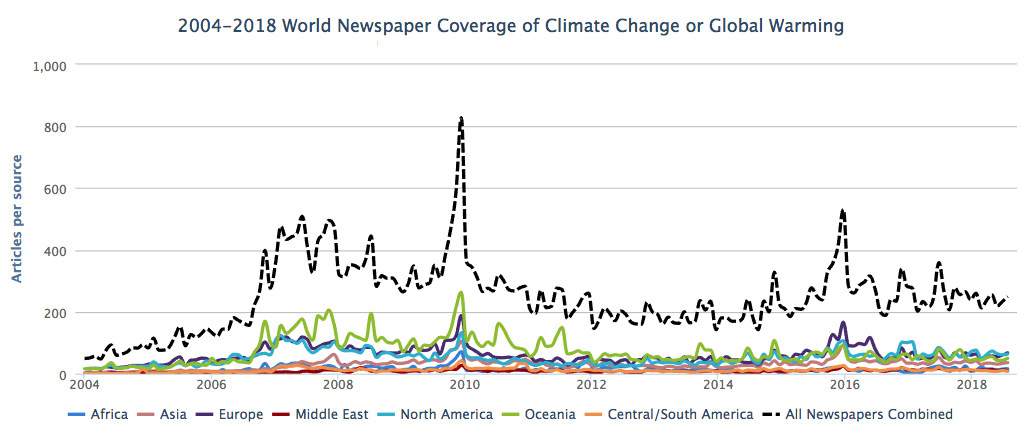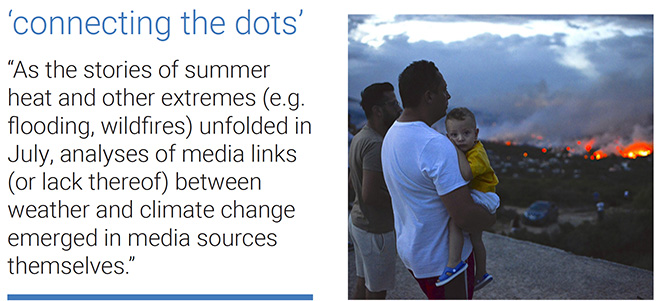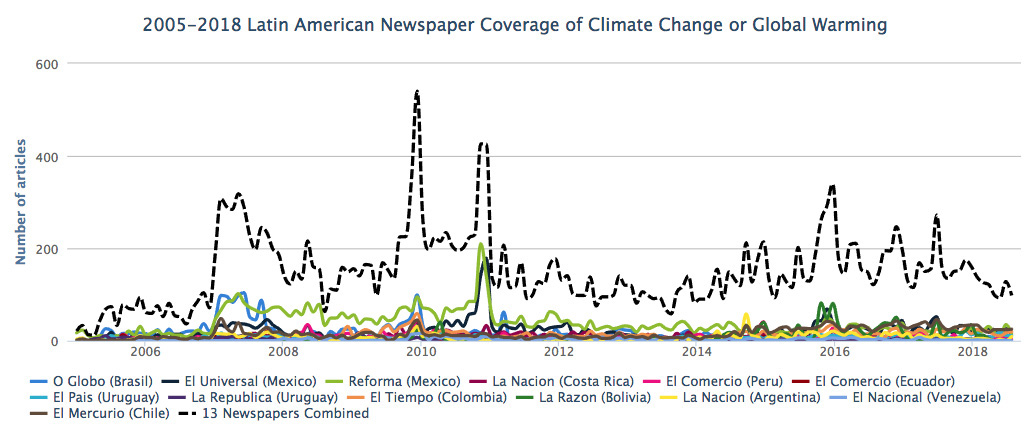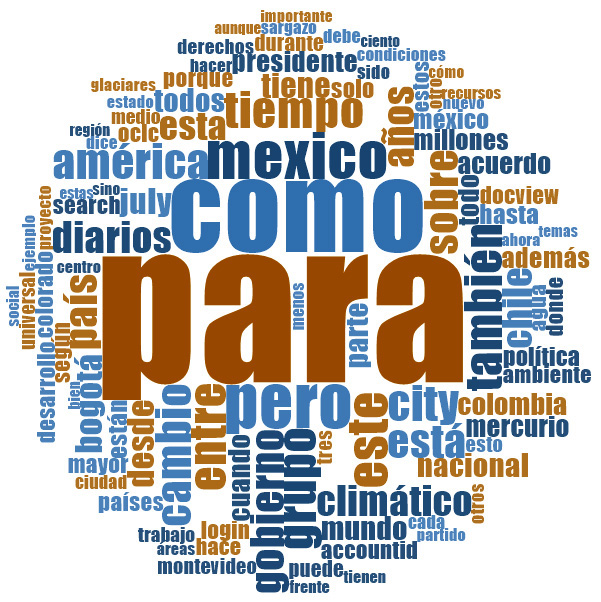|
|
| The Media and Climate Change Observatory (MeCCO) analyzes traditional/legacy media representations of climate change. MeCCO team endeavors to comprehensively aggregate, monitor, appraise and critically examine media coverage that influence the spectrum of possibility for effective responses to ongoing climate challenges. The MeCCO team monitors 74 sources (across newspapers, radio and TV) in 38 countries in seven different regions around the world. | |
Monthly Summary
|
|
July media attention to climate change and global warming was up 7% throughout the world from the previous month of June 2018, but down about 2% from July last year. Increases were detected in Asia (up 7%), Africa (up 9%) Europe (up 11%), Oceania (up 16%), and North America (up 5%), while going down in the Middle East and Central/South America (-23% in each). At the country level, coverage went up from the previous month in Australia (+20%), Germany (+28%), New Zealand (+9%), the United Kingdom (UK) (+13%), and the United States (+27%), while it went down in Canada (-29%), India (-7%), and Spain (-31%). Figure 1 shows these ebbs and flows in media coverage at the global scale – organized into seven geographical regions around the world – over the past 175 months (from January 2004 through July 2018). |
|
 Figure 1. Newspaper media coverage of climate change or global warming in sixty-two sources across thirty-five countries in seven different regions around the world, from January 2004 through July 2018. |
|
In January of this year, MeCCO expanded coverage to sixty-two newspaper sources, six radio sources and six television sources. These span across thirty-eight countries, in English, Spanish, German and Portuguese. We strengthened our Spanish-language searches for articles with the presence of terms "cambio climático" or "calentamiento global", while we expanded our searches now to Portuguese through searches for the terms "mudanças climáticas" or "aquecimento global". Figure 2 shows Latin American newspaper coverage over 163 months now (January 2005 through July 2018). |
|
Moving to considerations of content within these searches, Figure 3 shows word frequency data at the Latin American newspapers in July 2018. |
|
In July, considerable coverage related to ecological and meteorological issues, and this spun into a meta-analysis of the extent to which media connected extreme events (e.g. heat waves) with a changing climate. Beginning the month, there were a number of stories about extreme weather events around the world. For examples, in July heat records were set in many northern hemispheric countries. In particular, record setting lows in cities like Montreal, Quebec in Canada and Los Angeles, California in the US threatened vulnerable populations with unprecedented heat. While Alanne Orjoux from CNN reported on 17 heat-related deaths in Quebec at the time of reporting (raised a few days later to 33, according to ABC News (Australia)), over in the UK, the BBC reported record-setting heat across England and Wales. Meanwhile, southern California baked in many all-time temperature records. Journalist Shelby Grad from Los Angeles Times wrote that “the heat brought a big surge in power use — and power outages…Peak energy demand climbed to 6,256 megawatts Friday, knocking down the previous July record of 6,165 megawatts set in 2006 and making it the fifth-highest peak demand recorded in the city’s history…Consumers were urged to reduce their electricity usage from 2 p.m. to 9 p.m. Saturday, the hours when high use is typical. (Air conditioners pull much of that power, but other appliances such as washing machines, dryers and dishwashers also contribute)”. |
Figure 3. Word cloud showing frequency of words (4 letters or more) invoked in media coverage of ‘cambio climático’ or ‘calentamiento global’ in Spanish or ‘mudanças climáticas’ or ‘aquecimento global’ in Portuguese (climate change or global warming) in Latin American newspapers in July 2018. |
In mid-July, The Guardian journalist Jonathan Watts reported that “Record high temperatures have been set across much of the world this week as an unusually prolonged and broad heatwave intensifies concerns about climate change” and a “concern is that weather fronts – hot and cold – are being blocked more frequently due to climate change. This causes droughts and storms to linger, amplifying the damage they cause. This was a factor in the recent devastating floods in Japan, where at least 150 people died after rainfall up to four times the normal level”. On the heels of the flooding in Japan, a heat wave then swept over the country where many without power due to the flooding were vulnerable to the high daytime and nighttime temperatures. Journalist Elaine Lies from The Sydney Morning Herald wrote, “An intense heat wave has killed at least 14 people over a three-day long weekend in Japan, media reported on Tuesday, as high temperatures hampered recovery efforts in flood-hit areas where more than 200 people died last week”. At the end of July, journalists Saw Nang and Richard C. Paddock of The New York Times reported on Myanmar flooding that had displaced over 16,000 people by July 31. For the story they interviewed Myanmar’s minister of social welfare, relief and resettlement, Win Myat Aye, who blamed heavy monsoon rains and climate change for the recent flooding. He said, “I just want to alert the people that climate is changing all over the world and we all have to be careful about it”. However, while these particular stories made connections between weather and climate change, they were exceptions rather than the norm. In fact, as the stories of summer heat and other extremes (e.g. flooding, wildfires) unfolded in July, analyses of media links (or lack thereof) between weather and climate change emerged in media sources themselves. A Los Angeles Times opinion piece on July 15 titled ‘Climate change is behind the global heat wave, why won’t the media say it?’ appeared to catalyze this set of reflections. Author Leah Stokes wrote “Although [media] reports (sic)on each fresh disaster — every fire, every hurricane, every flood — it tends to stop short of linking extreme weather events to global warming, as though the subject were the exclusive province of reporters on the climate beat”. Then on July 25, Emily Aitkin of The New Republic called out ‘the media’s failure to connect the dots on climate change, asking “why are some major news outlets still covering extreme weather like it’s an act of God?”. From a UK perspective, on July 27 researcher Adam Corner drew out a lack of these connections when he wrote an opinion piece in the The New York Times entitled ‘Britain, Can We — Really — Talk About This Weather We’re Having?’. Then on July 29, journalist Laurel Wamsley from US National Public Radio asked the question ‘when the weather is extreme, is climate change to blame?’. Following all these stories, at the end of the month, Daisy Dunne and Robert McSweeney from Carbon Brief catalogued “how the media has reported the extreme weather and how the coverage has – or has not – referenced climate change”. And at the end of the month, in a New York Times story entitled ‘The Heat Is Coming in Waves and Surges’, journalists Somini Sengupta, Tiffany May and Zia ur-Rehman wrote, “Is it because of climate change?" Scientists with the World Weather Attribution project concluded in a study released Friday that the likelihood of the heat wave currently baking Northern Europe is “more than two times higher today than if human activities had not altered climate.” While attribution studies are not yet available for other record-heat episodes this year, scientists say there’s little doubt that the ratcheting up of global greenhouse gases makes heat waves more frequent and more intense”. Read more ... - report prepared by Max Boykoff and Ami Nacu-Schmidt |
|





